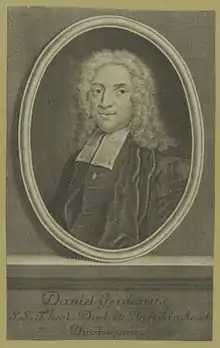
Daniel Gerdes, engraving by Johann Martin Bernigeroth.
Daniel Gerdes (Latin: Gerdesius) (19 April 1698, Bremen – 11 February 1765) was a German Calvinist theologian and historian. He became professor at the University of Duisburg in 1726,[1] and at the University of Groningen in 1736.[2]
While broadly supporting Protestant freedom of conscience, Gerdes drew a line in his attacks on the Mennonite minister Johannes Stinstra. In that case Gerdes used the views of Samuel Werenfels, tolerant and well thought of by Benjamin Hoadley, to condemn Stinstra.[3]
Works
Notes
- ↑ de:s:ADB:Gerdes, Daniel
- ↑ GAMEO page.
- ↑ Wim Janse; Barbara Pitkin (2006). The Formation of Clerical and Confessional Identities in Early Modern Europe. BRILL. p. 540. ISBN 978-90-04-14909-0. Retrieved 9 September 2012.
- 1 2 John Scott; Joseph Milner; Rev. Isaac Milner (1829). The History of the Church of Christ: Comprising the sequel of the Lutheran reformation, and the earlier period of the Reformation in Switzerland. R.B. Seely and W. Burnside. p. 13. Retrieved 9 October 2012.
External links
This article is issued from Wikipedia. The text is licensed under Creative Commons - Attribution - Sharealike. Additional terms may apply for the media files.